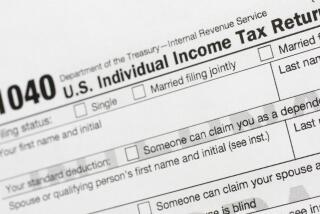Millions Have Yet to File New W-4; Face Deadline Next Week
- Share via
WASHINGTON — Less than a week before the deadline, millions of American workers have yet to file a new Form W-4 to adjust their tax withholding to conform with the overhauled federal tax code.
Under the law, enacted a year ago, workers must file a new W-4 with their employers before Oct. 1. Those who fail to comply could find their take-home pay sharply reduced.
The Internal Revenue Service, updating a survey completed by the Roper polling organization in late July, estimates that about 80% of workers have filed withholding forms this year. Since the agency was expecting about 94 million to file, that means about 18 million have not.
“It’s late, but there is still time to adjust your paycheck,” IRS spokeswoman Johnelle Hunter said Thursday. “It might be a good idea, even if you have filed a form earlier this year, to make the calculations again and, if necessary, file a new form to bring withholding in line with liability.”
The new withholding forms are necessary because the 1986 tax overhaul made numerous changes in basic tax provisions that affect many people.
On the plus side, tax rates have been cut significantly for most Americans. Standard deductions have been raised sharply. The personal exemption has been almost doubled, to $1,900.
On the other hand, the law repealed a special deduction for two-earner couples, affecting 50 million people. More than 36 million couples and individuals deducted their state and local sales taxes last year; that deduction, too, has been wiped out.
Similarly, about 7 million couples and individuals have lost all or part of their Individual Retirement Account deduction because of the new law. The 8 million people who received unemployment compensation in 1987 will be taxed fully on that money for the first time.
Deductions for interest on credit cards and other consumer borrowing have been slashed, affecting about 27 million filers; cuts in medical deductions will affect more than 11 million and about 33 million have lost part of their miscellaneous deductions.
Those changes have been affecting the tax liabilities of American workers since last Jan. 1. There is a good chance that any worker whose withholding has not been adjusted to reflect the same changes is having too little or too much withheld from each paycheck.
Those who neglect to file a W-4 this year will not be hit with a big fine or jail sentence. But, depending on their circumstances, they could face a big increase in withholding on Oct. 1 or owe the government a lot of money--plus a penalty--when they file their tax returns next year.
Effects of Tax Overhaul
Under the new law:
- A single person who does not file a new W-4 by the deadline will be given no more than one withholding allowance, even if otherwise entitled to more because of deductions or dependents.
An allowance on the withholding form is equal to the personal exemption on a tax return; it exempts $1,900 a year, $158.33 a month or $36.54 a week from withholding.
- A married worker will be authorized no more than two allowances until a new W-4 is filed.
What does it mean in terms of dollars and cents?
Assume a married worker earning $550 a week had a husband, two children and enough itemized deductions to qualify under the old law for a total of seven withholding allowances. Before 1987, that worker would have had $54 a week withheld from her check for federal income tax.
Two Forms Available
If she failed to file a new W-4 this year, her employer would withhold $37 a week. Depending on how many of her deductions were lost or reduced by the 1986 law, that might cause no problem at all. But it is possible that $37 was either too much or too little.
If over-withheld, the worker would get a refund when she files her return early next year, but she would have allowed the government interest-free use of her money. If under-withheld, she would have to pay the difference next year--and might be hit with a penalty as well.
Any employee may file either the four-page W-4 or the two-page W-4A. The IRS says the shorter version should be sufficient for all taxpayers except those with big amounts of non-wage income.
Single workers and one-earner couples who have only one job and do not itemize deductions probably need fill out only the first seven lines on the front of the W-4A plus the short withholding certificate.
More to Read
Inside the business of entertainment
The Wide Shot brings you news, analysis and insights on everything from streaming wars to production — and what it all means for the future.
You may occasionally receive promotional content from the Los Angeles Times.










